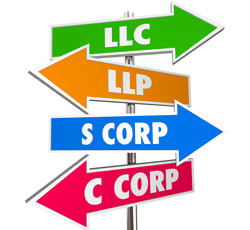
Tax Law Blog
- Posts by Michael C. Zahrt
 Shareholder
ShareholderMike is a business and estate planning lawyer in the Grand Rapids office of Foster Swift and is the current leader of the firm's Agri-Business sub-practice group. His area of expertise is business succession planning. This involves ...
Healthcare executives are advised to consider the significance of a ruling issued in 2024 by the Internal Revenue Service (IRS) which revoked the tax-exempt status of a non-profit organization. In Private Letter Ruling* 202437007, the IRS determined that a non-profit organization had failed the “operational test” and revoked its tax-exempt status.
The entity in question had indicated no charitable activities or related expenses, leading the IRS to conclude that the organization was not operating exclusively for tax-exempt purposes.
 In early June, the Supreme Court issued an opinion that clarifies how company-owned life insurance impacts the value of the company for estate tax purposes. As a business owner, you may need to re-evaluate the use of those policies and whether they will subject you to increased estate tax exposure. Here’s what happened in Connelly and how it may affect you.
In early June, the Supreme Court issued an opinion that clarifies how company-owned life insurance impacts the value of the company for estate tax purposes. As a business owner, you may need to re-evaluate the use of those policies and whether they will subject you to increased estate tax exposure. Here’s what happened in Connelly and how it may affect you.
 In a year that has forced many to be reactionary, tax planning offers an opportunity for business owners to be proactive about the health of their business as the end of 2020 draws near.
In a year that has forced many to be reactionary, tax planning offers an opportunity for business owners to be proactive about the health of their business as the end of 2020 draws near.
Attorney Michael Zahrt provides tax planning strategies for year end along with updates to the CARES Act and PPP Loans in the following short video:
The CARES Act created a number of new tax benefits that are available for one year only, and these benefits have largely been lost in the sea of various stimulus programs (and compliance with those programs).
For a more in depth look at tips for year end tax planning, visit the following article which summarizes a few tax opportunities available to your business before the end of 2020:
 The IRS recently issued Revenue Procedure 2019-38, which finalizes the safe harbor for rental property under Code Section 199A that was originally provided in IRS Notice 2019-07. The safe harbor treats a rental real estate enterprise as being eligible for the qualified business income deduction under Section 199A, even if it does not meet the definition of a “trade or business” as provided in Treas. Reg. 1.199-1(b)(14).
The IRS recently issued Revenue Procedure 2019-38, which finalizes the safe harbor for rental property under Code Section 199A that was originally provided in IRS Notice 2019-07. The safe harbor treats a rental real estate enterprise as being eligible for the qualified business income deduction under Section 199A, even if it does not meet the definition of a “trade or business” as provided in Treas. Reg. 1.199-1(b)(14).
 Many mature, Employee Stock Ownership Plan (ESOP)-owned companies consider making an S-election, and for good reason. An S Corporation owned 100% by an ESOP generally pays no federal income taxes. An S Election instantly boosts cash flow, which the company can use to fund growth opportunities or fund its annual ESOP repurchase obligations.
Many mature, Employee Stock Ownership Plan (ESOP)-owned companies consider making an S-election, and for good reason. An S Corporation owned 100% by an ESOP generally pays no federal income taxes. An S Election instantly boosts cash flow, which the company can use to fund growth opportunities or fund its annual ESOP repurchase obligations.
 Christmas music is back on the radio. If you’re a pointy-headed tax lawyer like me, that’s your reminder to start thinking about year-end tax planning considerations. Even if you’re not, you will want to start planning earlier than in years past to address all the changes brought by tax reform. We will hit the highlights here.
Christmas music is back on the radio. If you’re a pointy-headed tax lawyer like me, that’s your reminder to start thinking about year-end tax planning considerations. Even if you’re not, you will want to start planning earlier than in years past to address all the changes brought by tax reform. We will hit the highlights here.
 By now, you’ve probably read a variety of summaries about the new tax reform legislation. If you own a pass-through entity, you’ve probably wondered whether you should convert to a C Corporation (if you’re still wondering about that, check out Should You Convert Your Business to a C Corporation?). You may also be wondering how the new pass through deduction you keep hearing about works. That’s what we’re going to try to explain here.
By now, you’ve probably read a variety of summaries about the new tax reform legislation. If you own a pass-through entity, you’ve probably wondered whether you should convert to a C Corporation (if you’re still wondering about that, check out Should You Convert Your Business to a C Corporation?). You may also be wondering how the new pass through deduction you keep hearing about works. That’s what we’re going to try to explain here.
 Bloomberg BNA reports that the IRS is expected to announce proposed regulations for the full expensing provision under Code Section 168(k) sometime late-June or early-July.
Bloomberg BNA reports that the IRS is expected to announce proposed regulations for the full expensing provision under Code Section 168(k) sometime late-June or early-July.
 One of the biggest questions after the passage of tax reform is whether business owners should convert their pass-through entities to C Corporations to take advantage of the lower 21% tax rate. The answer to this question depends on your business goals. If your goal is to pass as much profit to yourself as possible, you should generally stick with the pass-through entity.
One of the biggest questions after the passage of tax reform is whether business owners should convert their pass-through entities to C Corporations to take advantage of the lower 21% tax rate. The answer to this question depends on your business goals. If your goal is to pass as much profit to yourself as possible, you should generally stick with the pass-through entity.
 The Senate is anticipated to vote on its own tax reform bill in the near future.
The Senate is anticipated to vote on its own tax reform bill in the near future.
 Each year a variety of items in the Internal Revenue Code are updated based on inflation, specifically the consumer price index.
Each year a variety of items in the Internal Revenue Code are updated based on inflation, specifically the consumer price index.
 On August 2, 2016, the IRS and U.S. Department of Treasury issued highly anticipated proposed regulations concerning the valuation of interests in certain family-controlled businesses for estate, gift and generation skipping transfer tax purposes. The proposed rules would curb the use of most discounts that are applied when valuing intra-family transfers.
On August 2, 2016, the IRS and U.S. Department of Treasury issued highly anticipated proposed regulations concerning the valuation of interests in certain family-controlled businesses for estate, gift and generation skipping transfer tax purposes. The proposed rules would curb the use of most discounts that are applied when valuing intra-family transfers.
Was your tax bill higher than what you had wanted it to be this year? It may be time to consider either changing your business structure or your business operations to be more tax efficient. Learn some quick tips from Attorney Mike Zahrt in the short video below.
 On July 22, the Michigan Supreme Court decided Detroit Edison Company v. Department of Treasury, holding that the Michigan Use Tax apportionment rules apply in situations where property is simultaneously used for exempt and non-exempt purposes. The claim was initiated by Detroit Edison Company ("DTE") in response to a use tax audit by the Department of Treasury. The audit determined that DTE wrongly claimed an exemption from use tax for property used outside of its plant (transformers, fuses, circuit breakers, etc.), resulting in a deficiency assessment of over $13 million plus interest.
On July 22, the Michigan Supreme Court decided Detroit Edison Company v. Department of Treasury, holding that the Michigan Use Tax apportionment rules apply in situations where property is simultaneously used for exempt and non-exempt purposes. The claim was initiated by Detroit Edison Company ("DTE") in response to a use tax audit by the Department of Treasury. The audit determined that DTE wrongly claimed an exemption from use tax for property used outside of its plant (transformers, fuses, circuit breakers, etc.), resulting in a deficiency assessment of over $13 million plus interest.
 On June 16, 2015, Gov. Rick Snyder signed into law Enrolled Senate Bill 100, which eliminates the requirement that taxpayers pay contested taxes, penalties and interest before appealing their liability to the Michigan Court of Claims. The bill was introduced by Senators Brandenburg, Horn, Zorn, Emmons, Colbeck, Schmidt, Hansen, Casperson, Nofs and Booher.
On June 16, 2015, Gov. Rick Snyder signed into law Enrolled Senate Bill 100, which eliminates the requirement that taxpayers pay contested taxes, penalties and interest before appealing their liability to the Michigan Court of Claims. The bill was introduced by Senators Brandenburg, Horn, Zorn, Emmons, Colbeck, Schmidt, Hansen, Casperson, Nofs and Booher.
Prior to the enactment of this law, a taxpayer had two options to appeal an adverse tax assessment or decision:
- the taxpayer could appeal the case to the Michigan Tax Tribunal without paying disputed amounts; or
- the taxpayer could appeal the case to the Michigan Court of Claims, but only after paying the taxes, penalties, and interest assessed, even if those amounts were being contested.
